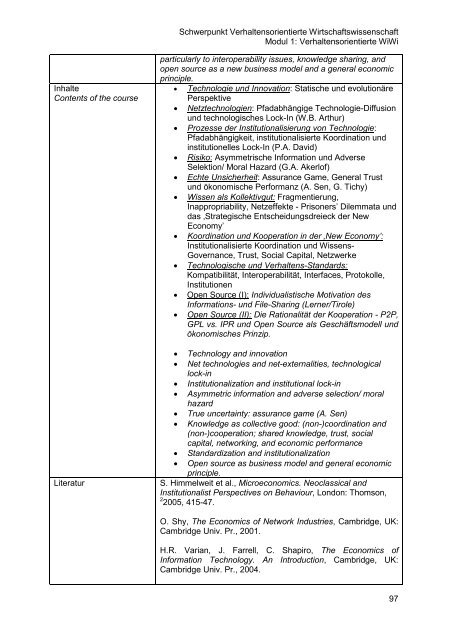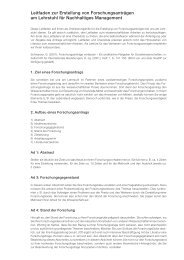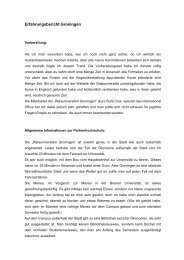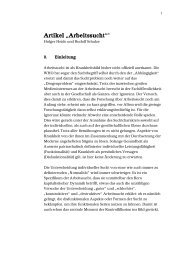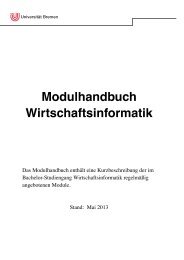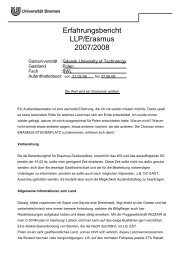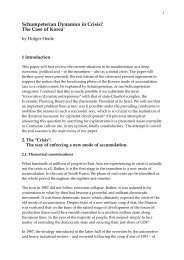Modulhandbuch_BWL_WiWi_WS 12_13.pdf - Fachbereich ...
Modulhandbuch_BWL_WiWi_WS 12_13.pdf - Fachbereich ...
Modulhandbuch_BWL_WiWi_WS 12_13.pdf - Fachbereich ...
Erfolgreiche ePaper selbst erstellen
Machen Sie aus Ihren PDF Publikationen ein blätterbares Flipbook mit unserer einzigartigen Google optimierten e-Paper Software.
Schwerpunkt Verhaltensorientierte WirtschaftswissenschaftModul 1: Verhaltensorientierte <strong>WiWi</strong>InhalteContents of the courseLiteraturparticularly to interoperability issues, knowledge sharing, andopen source as a new business model and a general economicprinciple.• Technologie und Innovation: Statische und evolutionärePerspektive• Netztechnologien: Pfadabhängige Technologie-Diffusionund technologisches Lock-In (W.B. Arthur)• Prozesse der Institutionalisierung von Technologie:Pfadabhängigkeit, institutionalisierte Koordination undinstitutionelles Lock-In (P.A. David)• Risiko: Asymmetrische Information und AdverseSelektion/ Moral Hazard (G.A. Akerlof)• Echte Unsicherheit: Assurance Game, General Trustund ökonomische Performanz (A. Sen, G. Tichy)• Wissen als Kollektivgut: Fragmentierung,Inappropriability, Netzeffekte - Prisoners’ Dilemmata unddas ‚Strategische Entscheidungsdreieck der NewEconomy’• Koordination und Kooperation in der ‚New Economy’:Institutionalisierte Koordination und Wissens-Governance, Trust, Social Capital, Netzwerke• Technologische und Verhaltens-Standards:Kompatibilität, Interoperabilität, Interfaces, Protokolle,Institutionen• Open Source (I): Individualistische Motivation desInformations- und File-Sharing (Lerner/Tirole)• Open Source (II): Die Rationalität der Kooperation - P2P,GPL vs. IPR und Open Source als Geschäftsmodell undökonomisches Prinzip.• Technology and innovation• Net technologies and net-externalities, technologicallock-in• Institutionalization and institutional lock-in• Asymmetric information and adverse selection/ moralhazard• True uncertainty: assurance game (A. Sen)• Knowledge as collective good: (non-)coordination and(non-)cooperation; shared knowledge, trust, socialcapital, networking, and economic performance• Standardization and institutionalization• Open source as business model and general economicprinciple.S. Himmelweit et al., Microeconomics. Neoclassical andInstitutionalist Perspectives on Behaviour, London: Thomson,2 2005, 415-47.O. Shy, The Economics of Network Industries, Cambridge, UK:Cambridge Univ. Pr., 2001.H.R. Varian, J. Farrell, C. Shapiro, The Economics ofInformation Technology. An Introduction, Cambridge, UK:Cambridge Univ. Pr., 2004.97


